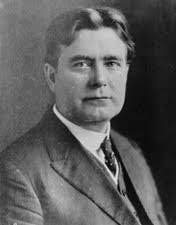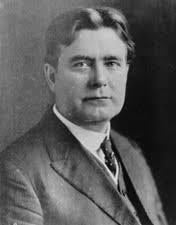The Remedy for Rogue Prosecutors
Over 100 years ago, a US Attorney launched a land fraud prosecution against a newly elected Senator from Idaho without the Justice Department's knowledge. It did not end well for the prosecutor.
Justice Briefs is a weekly newsletter devoted to federal criminal prosecution. The federal government’s evolution over the last 230 years has given federal prosecutors significant discretion. Few realize it exists and even fewer know how it is used. Justice Briefs aims to make federal prosecutions and prosecutors more accessible to the general public. Please help me in this endeavor by subscribing and sharing with others.
Justice in Brief
In the District of Massachusetts, a Harvard researcher was charged with attempting to smuggle noninfectious and nontoxic frog embryos into the United States. The charges were announced after a judge in Vermont ordered the researcher released from custody after the Secretary of State canceled her student visa.
In the Western District of Texas, a woman was charged with providing material support, including supplying grenades, to Cartel de Jalisco Nueva Generación, a drug cartel designated as a foreign terrorist organization by the Trump Administration in February. This is the first indictment since the designation.
In the Southern District of Georgia, thirty members of the gang “Sex Money Murder” were charged in a RICO indictment, alleging members participated in drug distribution, firearms trafficking, wire fraud, and murder.
Updates…
In the Southern District of New York, the RICO case against Sean “Diddy” Combs began with the government calling its star witness first.
After withdrawing his name as US Attorney for DC, President Trump named Ed Martin the lead Pardon Attorney for the Justice Department and serve as the head of its Weaponization Task Force. Martin said, “There are some really bad actors, some people that did some really bad things to the American people. And if they can be charged, we’ll charge them. But if they can’t be charged, we will name them. And we will name them, and in a culture that respects shame, they should be people that are ashamed. And that’s a fact. That’s the way things work. And so that’s, that’s how I believe the job operates.”
In an interesting move, President Trump named Deputy Attorney General Todd Blanche as the Librarian of Congress.
Sen. Chuck Schumer of New York has promised to halt all Justice Department nominees until he receives answers to questions about a luxury airplane that Qatar is gifting to President Trump.
Documents released by the Government in the Eric Adams case undermine the Justice Department argument that the prosecution was politically motivated as the Adams investigation began prior to Adams’ election as New York’s mayor.
When politics outweigh the evidence…
Last year, the United States Supreme Court considered whether presidents have any immunity from criminal prosecution. During the oral arguments, at least one Justice expressed concern that a rogue prosecutor might take aim at a former president based on political animosity. The concern seemed far-fetched as federal prosecutors today have considerable oversight and do not act, especially in cases against members of Congress, without many layers of review. Just because the concern might be far-fetched does not mean it is unfounded. My research at the Library of Congress this week uncovered the prosecution of Idaho Senator William Borah. The US Attorney for Idaho, who initiated the charges contrary to the Justice Department’s wishes, was fired.
The case arose against the backdrop of an increasingly volatile dispute between the capitalists and labor. In Idaho, the batter took place between miners and the people who ran the mines. Wanting better working conditions, the miners, led by Bill Haywood, went on strike. Governor and banker Frank Steunenberg shut down the strike by calling in federal forces. On December 30, 1905, years after leaving the governorship, as he opened the gate to his home, a bomb detonated, killing him. An investigation quickly discovered the bomber. The bomber, in a long confession, stated he was hired by Haywood to set the bomb. The trial became a cause celebre as famed defense attorney Clarence Darrow represented Haywood and the newly elected junior Senator from Idaho, William Borah, represented the state.
Borah’s prosecution of Haywood made Borah a target of the labor movement. Though he identified as a Republican, he supported issues more than parties. This led to a certain amount of isolation, but Borah supported Republican Theodore Roosevelt in 1904. Borah had made a name for himself prosecuting a union worker for murder. With this backgroun, Haywood, and his political allies, took aim at Borah. One way to do this was to investigate Borah’s business dealings.
Investigators came across the Barber Lumber Company. In addition to mining, Idaho featured large forests that attracted industrialists. Barber and two others from Wisconsin arrived in Boise and opened a lumber company. Borah was the company’s local legal counsel. Federal law prohibited large-scale corporate land purchases. Many lumber companies skirted the law by identifying straw purchases, people who would purchase land for the corporations. One purchaser for the Barber Lumber Company was Governor Steunenberg. Federal investigators commenced their investigation and believed Borah, as legal counsel, advised the Barber Lumber Company that the sales were lawful.
Idaho’s United States Attorney Norman Ruick took the case from there. In March, 1907, two months before the Haywood trial, Ruick informs United States Attorney General Charles Bonaparte that Steunenberg was involved in the land fraud but will ensure the information does not become public. Of course, this did not happen. A month later, Borah wrote to a friend that he will likely be indicted for the land fraud. This led to Ruick’s recall to Washington so he could speak directly with Bonaparte about the case. Ruick explained that the prosecution was authorized by Acting Attorney General Milton Purdy, who had been with the Department since 1903. Prior to that, Purdy had been an Assistant and then United States Attorney in Minnesota.
When Bonaparte and Ruick discussed the evidence, two problems arose. For many defendants, including Steunenberg, the statute of limitations had expired, meaning that they could not be prosecuted. For politically prominent Borah, however, this was not the case. The problem with his case was that he did not profit financially from the scheme. Bonaparte communicated to Ruick that if Ruick were to proceed on Borah’s case, the proof of guilt would have to be so strong that there would be no question of political motivation behind the prosecution.
Following the meeting, Bonaparte had significant reservations. He told President Roosevelt that Bonaparte would not have proceeded based on the evidence Ruick presented. Removing Ruick at this time, however, was not advisable as it would look like the Administration was protecting a political ally. Ultimately, Bonaparte decided Ruick must act in a manner that places himself in a situation whereby his removal is for competence reasons rather than political reasons.
In August, 1907, Borah’s representatives, Bonaparte, and Roosevelt met to discuss the case. Borah’s representatives sought the case’s dismissal. Bonaparte and Roosevelt agreed only that the case should be tried quickly as Borah was to take his seat in the Senate that December.
Following the meeting, Roosevelt also suggested that Ruick be replaced. Roosevelt expressed concern that Ruick initially complained about the Administration moving too slowly and, when told to pursue the case rapidly, complained that an immediate trial is too fast. Bonaparte disagreed. Should Ruick be removed and an acquittal follow, Bonaparte argued, their opponents could claim it was Ruick’s removal that led to the acquittal and that the Administration thereby protected its ally. Bonaparte further speculated that Ruick expects to lose the trial and his position and is doing everything possible to hold onto it. Roosevelt understood Bonaparte’s position and agreed Ruick should not be removed yet. Roosevelt countered Bonaparte by explaining the decision to have a rapid trial for Borah was a matter of policy because Borah was soon to attend the Senate. Thus, if Ruick refused to try Borah’s case quickly, Ruick could be removed on that basis.
Ruick did not respond kindly to the Justice Department’s instructions. He messaged the Administration that he would dismiss the Borah case and state in open court that it was due to Roosevelt’s and Bonaparte’s conduct.
Roosevelt was not amused and instructed Bonaparte how to respond. In a telegram to Ruick, Bonaparte explained that people close to the President requested dismissal of the case but, based on Ruick’s assurances, Roosevelt refused the request. Bonaparte then cited Ruick’s own messages that there was no reason for the case not to proceed to trial as quickly as possible. In the midst of that, Bonaparte observed that Ruick never informed the Department that Borah would be indicted. Finally, based on Ruick’s inconsistent statements about the case’s viability, the case would be turned over to a special counsel for an independent assessment.
Bonaparte appointed Assistant Attorney General Marsden Burch to oversee the case. When Burch arrived, he learned Ruick was connected to further misconduct in the investigation. Burch impaneled a special grand jury to inquire further. Rumors circulated that Ruick had packed the grand jury to secure Borah’s indictment despite insufficient evidence. Burch also secured additional evidence by granting minor players immunity.
Ultimately, the case turned on Borah’s knowledge of the straw purchases. As legal counsel handling the transaction, he likely knew what was happening but proof beyond a reasonable doubt was lacking. The jury quickly acquitted him. Borah would go on to become a prominent progressive Senator, serving on the Senate Foreign Relations Committee.
As for Ruick, he would remain in his post until May, 1908, when Bonaparte demanded Ruick’s resignation. The primary basis for it was his insubordination and misconduct in Borah’s case.
At least two lessons emerge from this case. First, as the Supreme Court observed in its questions during the Trump immunity case, United States Attorneys have the ability to pursue cases without significant Justice Department oversight. While this might sound threatening at first, the second lesson from the case is that the sitting President has the ultimate authority in such situations. In this instance Ruick brought the charges and had an articulable basis for them. Yet when Ruick did not comply with the Administration’s instructions, the President used the President’s authority to order Ruick’s de facto replacement through the use of a special assistant attorney general. This brought the case under the Justice Department’s more direct control. Thus, for a rogue prosecutor to pursue a former president, the current President must concur.
The case also illuminates the complexity of politically sensitive prosecutions. Throughout the case, Roosevelt and Bonaparte were sensitive to the public’s perceptions of their conduct. The case represented the conflict between the capitalists and the laborers. Roosevelt did not want to be perceived as favoring the capitalists and undermining his public lands policy to save a political ally. Decisions were made on this basis. Ultimately, however, they recognized that, if there was sufficient evidence, it could overcome any political overtones. This is an essential aspect of politically sensitive prosecutions. Allegations of favoritism can only be rebutted by strong evidence of guilt. Even if a jury disagrees, the government can justify its conduct. The Bondi Justice Department would be well to keep this in mind as it launches investigations into Trump’s political enemies, including New York Attorney General Letitia James.
I hope you enjoyed this issue and that it made you stop and think. I would love to hear any comments, questions, concerns, or criticisms that you have. Leave a comment or send a message! Also, if you enjoyed this or if it challenged your thinking, please subscribe and share with others!




